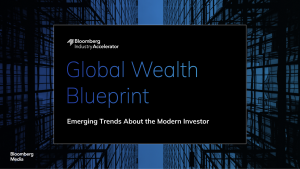July 27, 2023
New dynamics are shaping financial decision-making as investors face significant disruptions in technology, geo-political complexities, emerging platforms, and post-pandemic influences. For brands seeking to connect with these investors, understanding their attitudes, motivations, and behaviors is critical, especially as the pace of change accelerates.
The Global Wealth Blueprint, part of the Bloomberg Industry Accelerator, Bloomberg Media’s leading source of proprietary sector and audience related analyses and thought leadership, enables deeper insight into investor mindsets across the US, UK, France, Germany, UAE, and APAC. The findings provide a thought-provoking perspective on how investors around the world are reacting to external forces and highlights surprising nuances in regional and generational investor perspectives.
To learn more about the findings from our Global Wealth Blueprint, we sat down with Bloomberg Media’s Global Head of Data Science & Insights, Michelle Lynn. Scroll down to view the global research summary.
Q: What did the Global Wealth Blueprint reveal around Modern Investors’ sentiment and mindset around the opportunities in front of them to build wealth?
For the Global Wealth Blueprint, we really focused on understanding not only how investors feel about the macroeconomic factors influencing their portfolios, but also self-assessments of their own capabilities. Although the research indicates that investors foresee external forces impacting their financial health, many of our findings highlight a sense of optimism for the potential of what lies ahead.
Notably, 70% of investors in the US and Europe recognize that there are more ways to build wealth today than 20 years ago. This could be attributed to the fact that Modern Investors are open to and embracing new streams of income. Investors around the world are diversifying their sources of income beyond their jobs through real estate, starting businesses, and even becoming social media influencers—and our analysis shows this is happening at scale.
Q: With conversations around AI dominating the news cycle, curious to know how investors are feeling about its impact on building wealth?
When we probed investors about AI’s role in their investing strategies, we learned that, no surprise, they have high expectations that it will revolutionize financial decision-making. High-net-worth (HNW) investors are more likely to have a positive outlook on its integration into investing processes than the general population. We see that across continents, Millennial investors are more likely to have an optimistic view of AI compared to Gen X and Boomers, with the exception of Germany, where unexpectedly Gen X is the cohort with the most positive outlook.
The perceived greatest benefits of AI globally are its ability to conduct continuous portfolio and market monitoring and better forecasting of performance, but we see regional discrepancies here as well. For example, the UAE strongly believes that AI will help reduce emotional bias in decision-making, with 61% of investors there ranking this as a top 3 benefit. APAC investors are more interested in portfolio optimization, compared to European and US investors. Overall, our research shows buzz and excitement about AI, among investors, with some saying they’re already seeing tangible applications.
Q: Through our editorial teams, Bloomberg covers the latest news on the intersection of sustainability and finance. How are Modern Investors translating their values into investment decisions?
Globally, investors say they have a desire to support their personal values through investment decisions, and our study indicates that the E (environment) is the primary focus within ESG investing. But here too we see some interesting regional differences, and not all components of E are treated equally across countries. APAC and UAE investors prefer to focus on energy efficiency while European and US regions have their attention on climate change more broadly.
Despite the desire to support progress in these areas, we continue to see a material lack of familiarity and knowledge of ESG investing. This is a barrier for investors who may want to factor in ethical considerations. In European and US markets specifically, over 90% of high-net-worth (HNW) investors say their personal values play a role in investment decisions, but that does not translate to the number of HNW investors currently investing. For example, only 15% of US HNW investors say they currently participate. Approximately 45% of respondents who are not investing in ESG feel like “they don’t know enough about what ESG investing is.” It’s clear that there is a role for brands to bring value to investors by fulfilling the need for education and thought leadership in this space.
Q: You mentioned an opportunity for knowledge building with investors; did your research indicate trends on how they prefer to stay informed on the evolving macroeconomic factors that are impacting their wealth?
Yes, in the Global Wealth Blueprint, we wanted to surface data that will help marketers make connections with investors. Across geographies, our research reveals the healthy appetite for financial information, especially when it is provided by a trusted news source like Bloomberg. In fact, when asked about go-to sources beyond financial advisors, both general and HNW investors ranked “news and media” as a critical source for financial advice.
While receptivity to news and media crosses regions, generations and investment levels, the preferred formats for consuming financial content differ amongst the groups we spoke to. For example, across all regions, HNW investors have a greater reliance on long-form written formats (e.g., newsletters and articles) than general investors. HNW investors in European regions were 2x more likely to prefer watching social videos than those in the US. From a generational perspective, Millennials are more open to perhaps less obvious sources of financial content, including social media, influencers, and podcasts. These days it can be overwhelming for marketers to identify the right mix to drive the greatest return on investment. Insights from the Global Wealth Blueprint will allow us to create strategic messaging, content, and activation plans with investors’ preferences at the core.
Read the global research summary for Bloomberg Industry Accelerator’s Global Wealth Blueprint:
